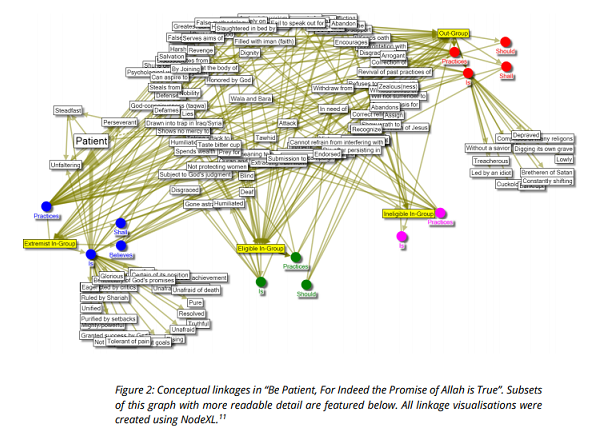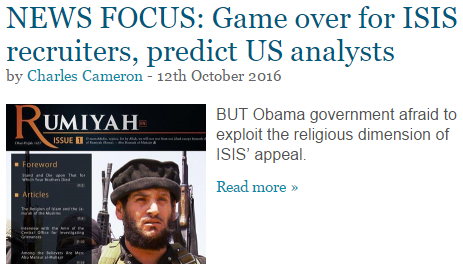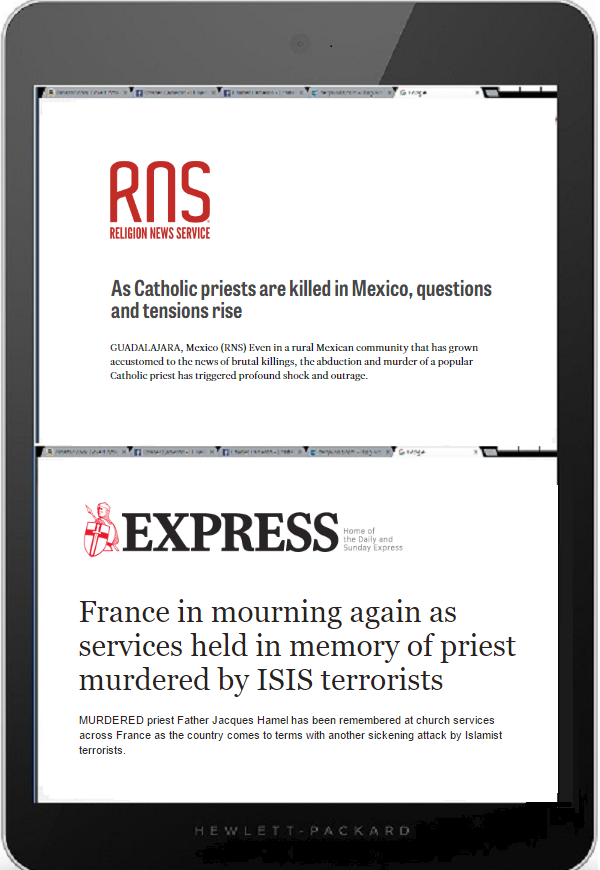Jessica Dawson on Relationships with God and Community as Critical Nodes in Center of Gravity Analysis
Friday, April 13th, 2018[ by Charles Cameron — An important article, meaning one with which I largely, emphatically agree ]
.
Let me repeat: Jessica Dawson‘s piece for Strategy Bridge is an important article, meaning one with which I largely, emphatically agree — a must-read.
**
Prof Dawson writes:
There is a blind spot in U.S. joint doctrine that continually hinders operational planning and strategy development. This blind spot is a failure to account for critical relationships with a person’s conception of god and their community, and how these relationships impact the operational environment.
Let’s just say I was a contributing edtor at Lapido Media until its demise, writing to clue journos in to the religious significance of current events:
Lapido, Venerating Putin: Is Russia’s President the second Prince Vlad? Lapido, ANALYSIS When laïcité destroys egalité and fraternité
Lapido is essentially countering the same blind spot at the level of journos, and hence the public conversation.
**
I haven’t focused on the relationship with community, but I have written frequently on what von Clausewitz would call “morale” in contrast with men and materiel. Prof Dawson addresses this issue:
Understanding religion and society’s role in enabling a society’s use of military force is inherently more difficult than counting the number of weapons systems an enemy has at its disposal. That said, ignoring the people aspect of Clausewitz’s trinity results in an incomplete analysis.
Indeed, I’ve quoted von Clausewitz on the topic:
Essentially, war is fighting, for fighting is the only effective principle in the manifold activities designated as war. Fighting, in turn, is a trial of moral and physical forces through the medium of the latter. Naturally moral strength must not be excluded, for psychological forces exert a decisive in?uence on the elements involved in war.
and:
One might say that the physical seem little more than the wooden hilt, while the moral factors are the precious metal, the real weapons, the finely honed blade.
**
And Prof Dawson is interested in “critical nodes” and the mapping of relationships, vide her title:
Relationships with God and Community as Critical Nodes in Center of Gravity Analysis
:
This too is an area I am interested in, as evidenced by my borrowing one of my friend JM Berger‘s detailed maps in my post Quant and qualit in regards to “al wala’ wal bara’”:

That’s from JM’s ICCT paper, Countering Islamic State Messaging Through “Linkage-Based” Analysis
Indeed, my HipBone Games are played on graphs as boards, with conceptual moves at their nodes and connections along their edges, see my series On the felicities of graph-based game-board design: twelve &c.
**
My specific focus, games aside, has been on notions of apocalypse as expectation, excitation, and exultation — in my view, the ultimate in what Tillich would call “ultimate concerns”.
As an Associate and sometime Principal Researcher with the late Center for Millennial Studies at Boston University, I have enjoyed years of friendship and collaboration with Richard Landes, Stephen O’Leary and other scholars, and contribuuted to the 2015 Boston conference, #GenerationCaliphate: Apocalyptic Hopes, Millennial Dreams and Global Jihad
**
I could quote considerably more from Jessica Dawson’s piece, but having indicated some of the ways in which her and my own interests run in parallel, and why that causes me to offer her high praise, I’d like quickly to turn to two areas in which my own specialty in religious studies — new religious movements and apocalyptic — left me wishing for more, or to put it more exactly, for more recent references in her treatment of religious aspects.
Dr Dawson writes of ISIS’ men’s attitudes to their wives disposing of their husbands’ slaves:
This has little to do with the actual teachings of Islam
She also characterizes their actions thus:
They are granted authority and thus power over the people around them through the moral force of pseudo religious declarations.
Some ISIS fighters are no doubt more influenced by mundane considerations and some by religious — but there’s little doubt that those religious considerations are anything but “pseudo religious”. Will McCants‘ book, The ISIS Apocalypse: The History, Strategy, and Doomsday Vision of the Islamic Stat traces the history of ISIS’ theology from hadith locating the apocalypse in Dabiq through al-Zarqawi and al-Baghdadi to the loss of much of the group’s territory and the expansion of its reach via recruitment of individuals and cells in the west.. leaving little doubt of the “alternate legitimacy” of the group’s theological claims. Graeme Wood‘s Atlantic article, to which Prof Dawson refers us, is excellent but way shorter and necessarily less detailed.
On the Christian front, similarly, eschatology has a role to play, as Prof Dawson recognizes — but instead of referencing a 2005 piece, American Rapture, about the Left Behind series, she might have brought us up to datw with one or both of two excellent religious studies articles:
Julie Ingersoll, Why Trump’s evangelical supporters welcome his move on Jerusalem Diana Butler Bass, For many evangelicals, Jerusalem is about prophecy, not politics
As their parallel titles suggest, Trump’s decision to move the US Embassy in Israel to Jerusalem — which received a fair amount of press at the time that may have mentioned such a move would please his evangelical base, but didn’t explore the theology behind such support in any detail — has profound eschatpological implications.
Julie Ingersoll’s book, Building God’s Kingdom: Inside the World of Christian Reconstruction, is excellent in its focus on the “other side” of the ceontemporary evangelical right, ie Dominionism, whose founding father, RJ Rushdoony was a post-millennialist in contrast to La Haye and the Left Behind books — his followers expect the return of Christ after a thousand year reign of Christian principles, not next week, next month or in the next decade or so.
Sadly, the Dominionist and Dispensationalist (post-millennialist and pre-millennialist) strands in the contemporary Christian right have mixed and mingled, so that it is hard to keep track of who believed in which — or what!
**
All the more reason to be grateful for Prof Dawson’s emphasis on the importance of religious knowledge in strategy and policy circles.
Let doctrine (theological) meet and inform doctrine (military)!







